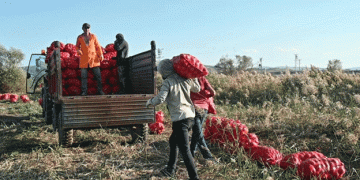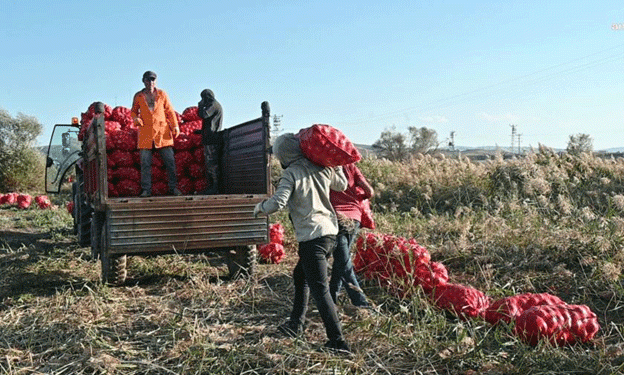Yozgat, a province in central Turkey, has seen a surge in onion production this year, leading to a market oversupply. The region’s onion farmers, struggling to cover their production costs, are turning to storage to prevent their crops from rotting in the field. Many farmers, unable to sell their onions at market price, are facing the grim reality of having to store their crops, hoping for better prices in the future.
In the Yerköy and Aydıncık districts of Yozgat, farmers planted onions as an alternative crop, hoping to diversify their income. However, the market is flooded with onions, and despite the efforts of the producers, the lack of demand has pushed prices down. With the export market closed, local producers are unable to find buyers willing to pay a fair price.
Economic Pressures on Onion Farmers
Osman Tuna Arslan, a farmer from Yerköy, highlighted the financial strain caused by these conditions. “We planted onions this year, but the yield is still sitting in the field. We are left with no choice but to sell it at whatever price the traders offer,” he said. The prices have dropped to around ₺4-6 per kg, well below the ₺13-15 per kg that onions are sold for in supermarkets. Despite spending approximately ₺400,000 on production costs for his 20-decare plot, Arslan notes that he will likely only recoup a fraction of that investment at current prices.
Arslan also discussed the broader economic challenges, mentioning his rising electricity bills, which have nearly doubled in the past few months. This increase in costs is compounded by other essential inputs like fuel and fertilizers. Despite this, the price of onions remains stagnant, leaving farmers like Arslan with little choice but to endure the financial burden.
The Larger Agricultural Context
This situation in Yozgat reflects broader trends in Turkish agriculture. According to the Turkish Statistical Institute, onion production in Turkey reached 2.6 million tons in 2023, an increase of 10.6% over the previous year. However, the growing output has not been matched by demand, especially in international markets, where exports have been limited.
The challenges faced by farmers in Yozgat are not isolated. Similar issues are occurring across Turkey, as farmers in other regions also struggle with fluctuating prices, rising input costs, and a lack of government support. Osman Tuna Arslan’s call for reform in civil society organizations highlights the need for structural changes to better support farmers and ensure that their rights are represented in policy-making decisions.
Strategies for Addressing the Crisis
- Government Intervention: One of the most immediate solutions would be for the government to step in and stabilize onion prices. This could include direct purchases from farmers or subsidies to help cover production costs.
- Improved Market Access: Expanding export markets and ensuring that farmers can access international buyers at fair prices would help reduce market saturation.
- Production Planning: Better crop planning to align production with actual demand can help avoid surpluses and stabilize prices.
- Support for Farmers: In addition to market interventions, providing financial support to farmers, such as grants or low-interest loans, could help ease the financial strain of fluctuating prices.
The onion production crisis in Yozgat is a microcosm of broader agricultural challenges in Turkey. Farmers are caught in a cycle of rising costs, low prices, and uncertain markets. To ensure the sustainability of the agricultural sector, urgent reforms are needed at both the governmental and organizational levels. Farmers need better support to navigate these economic challenges, and a more structured approach to production planning and market access will be key to their future success.































